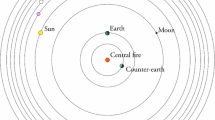Abstract
In 1543, Nicolas Copernicus published his De revolutionibus orbium coelestium, in which he proposed a radical reordering of the celestial order that put the Sun at the center of planetary motion. The proposal was a profound departure from the prevailing geocentric cosmology in the sixteenth century, which was largely based on Aristotelian physics and Ptolemaic astronomy. While the significance of heliocentrism for history of science cannot be overstated, astronomy both before and after Copernicus has a long and complex history that provides essential context for understanding the significance of his heliocentric turn.
Similar content being viewed by others
References
Copernicus, N. 1973. The derivation and first draft of Copernicus’s planetary theory: A translation of the Commentariolus with Commentary. Trans. N.M. Swerdlow. Proceedings of the American Philosophical Society 117: 423–512.
Copernicus, N. 1992. On the revolutions. Trans. E. Rosen. Baltimore: The Johns Hopkins University Press.
Feldhay, R., and F.J. Ragep. 2017. Before Copernicus: The cultures and contexts of scientific learning in the fifteenth century. Montreal: McGill-Queens University Press.
Finocchiaro, M.A. 2002. Philosophy versus religion and science versus religion: The trials of Bruno and Galileo. In Defending Copernicus and Galileo: Critical reasoning in the two affairs, ed. H. Gatti, 51–96. Dordrecht: Springer.
Gingerich, O. 2004. The book nobody read: Chasing the revolutions of Nicolaus Copernicus. New York: Walker & Company.
Goddu, A. 2010. Copernicus and the Aristotelian tradition: Education, reading, and philosophy in Copernicus’s path to heliocentrism. Leiden: Brill.
Goldstein, Bernard. 2002. Copernicus and the origin of his heliocentric system. Journal for the History of Astronomy 33: 219–235.
Granada, M.A., P.J. Boner, and D. Tessicini, eds. 2016. Unifying heaven and earth: Essays in the history of early modern cosmology. Barcelona: Edicions de la Universitat de Barcelona.
Kuhn, T. 1957. The Copernican revolution. Cambridge, MA: Harvard University Press.
Omodeo, P.D. 2014. Copernicus in the cultural debates of the renaissance: Reception, legacy, transformation. Leiden: Brill.
Ragep, F.J. 2007. Copernicus and his Islamic predecessors. History of Science 45: 65–81.
Saliba, G. 2007. Islamic science and the making of the European renaissance. Cambridge, MA: MIT Press.
Vesel, M. 2014. Copernicus: Platonist astronomer-philosopher: Cosmic order, the movement of the earth, and the scientific revolution. Frankfurt am Main: Peter Lang.
Westman, R. 1975. The Melanchthon circle, Rheticus, and the Wittenberg interpretation of the Copernican theory. Isis 66: 165–193.
Westman, R. 2012. The Copernican question: Prognostication, skepticism, and celestial order. Chicago: University of Chicago Press.
Author information
Authors and Affiliations
Corresponding author
Editor information
Editors and Affiliations
Section Editor information
Rights and permissions
Copyright information
© 2020 Springer Nature Switzerland AG
About this entry
Cite this entry
Gaida, M.E. (2020). Heliocentrism. In: Sgarbi, M. (eds) Encyclopedia of Renaissance Philosophy. Springer, Cham. https://doi.org/10.1007/978-3-319-02848-4_926-1
Download citation
DOI: https://doi.org/10.1007/978-3-319-02848-4_926-1
Received:
Accepted:
Published:
Publisher Name: Springer, Cham
Print ISBN: 978-3-319-02848-4
Online ISBN: 978-3-319-02848-4
eBook Packages: Springer Reference Religion and PhilosophyReference Module Humanities and Social SciencesReference Module Humanities




